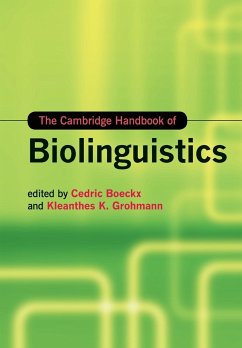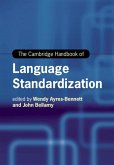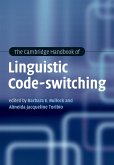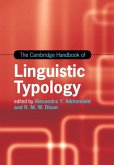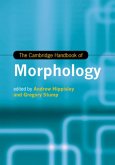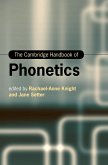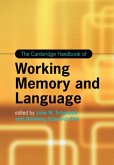The Cambridge Handbook of Biolinguistics
Herausgeber: Boeckx, Cedric; Grohmann, Kleanthes K.
The Cambridge Handbook of Biolinguistics
Herausgeber: Boeckx, Cedric; Grohmann, Kleanthes K.
- Broschiertes Buch
- Merkliste
- Auf die Merkliste
- Bewerten Bewerten
- Teilen
- Produkt teilen
- Produkterinnerung
- Produkterinnerung
This Handbook offers the most comprehensive state-of-the-field survey of the subject available. A team of prominent scholars working in a variety of disciplines is brought together to examine language development, language evolution and neuroscience, as well as providing overviews of the conceptual landscape of the field.
Andere Kunden interessierten sich auch für
![The Cambridge Handbook of Japanese Linguistics The Cambridge Handbook of Japanese Linguistics]() The Cambridge Handbook of Japanese Linguistics53,99 €
The Cambridge Handbook of Japanese Linguistics53,99 €![The Cambridge Handbook of Language Standardization The Cambridge Handbook of Language Standardization]() The Cambridge Handbook of Language Standardization44,99 €
The Cambridge Handbook of Language Standardization44,99 €![The Cambridge Handbook of Linguistic Code-switching The Cambridge Handbook of Linguistic Code-switching]() The Cambridge Handbook of Linguistic Code-switching68,99 €
The Cambridge Handbook of Linguistic Code-switching68,99 €![The Cambridge Handbook of Linguistic Typology The Cambridge Handbook of Linguistic Typology]() The Cambridge Handbook of Linguistic Typology69,99 €
The Cambridge Handbook of Linguistic Typology69,99 €![The Cambridge Handbook of Morphology The Cambridge Handbook of Morphology]() The Cambridge Handbook of Morphology201,99 €
The Cambridge Handbook of Morphology201,99 €![The Cambridge Handbook of Phonetics The Cambridge Handbook of Phonetics]() The Cambridge Handbook of Phonetics165,99 €
The Cambridge Handbook of Phonetics165,99 €![The Cambridge Handbook of Working Memory and Language The Cambridge Handbook of Working Memory and Language]() The Cambridge Handbook of Working Memory and Language45,99 €
The Cambridge Handbook of Working Memory and Language45,99 €-
-
-
This Handbook offers the most comprehensive state-of-the-field survey of the subject available. A team of prominent scholars working in a variety of disciplines is brought together to examine language development, language evolution and neuroscience, as well as providing overviews of the conceptual landscape of the field.
Produktdetails
- Produktdetails
- Cambridge Handbooks in Language and Linguistics
- Verlag: Cambridge University Press
- Seitenzahl: 694
- Erscheinungstermin: 20. November 2017
- Englisch
- Abmessung: 244mm x 170mm x 38mm
- Gewicht: 1214g
- ISBN-13: 9781108454100
- ISBN-10: 1108454100
- Artikelnr.: 50448586
- Herstellerkennzeichnung
- Libri GmbH
- Europaallee 1
- 36244 Bad Hersfeld
- gpsr@libri.de
- Cambridge Handbooks in Language and Linguistics
- Verlag: Cambridge University Press
- Seitenzahl: 694
- Erscheinungstermin: 20. November 2017
- Englisch
- Abmessung: 244mm x 170mm x 38mm
- Gewicht: 1214g
- ISBN-13: 9781108454100
- ISBN-10: 1108454100
- Artikelnr.: 50448586
- Herstellerkennzeichnung
- Libri GmbH
- Europaallee 1
- 36244 Bad Hersfeld
- gpsr@libri.de
1. Introducing the volume Kleanthes K. Grohmann and Cedric Boeckx; 2.
Biolinguistics - a historical perspective Lyle Jenkins; 3. Biolinguistics
yesterday, today and tomorrow Massimo Piattelli-Palmarini; 4. The
philosophical foundations of biolinguistics James McGilvray; Part I.
Language Development: 5. (Evidence for) the language instinct Ianthi Maria
Tsimpli; 6. Sensitive phases in successive language acquisition: the
critical period hypothesis revisited Jürgen M. Meisel; 7. Discovering word
forms and word meanings: the role of phrasal prosody and function words
Séverine Millotte, Elodie Cauvet, Perrine Brusini and Anne Christophe; 8.
Luria's biolinguistic suggestion and the growth of language Ken Wexler; 9.
Parameters in language acquisition Lisa Pearl and Jeffrey Lidz; 10.
Bilingualism beyond language: on the impact of bilingualism on executive
control Mireia Hernández, Clara D. Martin, Núria Sebastián-Gallés and
Albert Costa; Part II. Mind, Brain, Behavior: 11. The role of experimental
syntax in an integrated cognitive science of language Jon Sprouse and Diogo
Almeida; 12. Working memory and language processing: theory, data and
directions for future research Matthew Wagers and Brian McElree; 13.
Computational primitives in phonology and their neural correlates Philip J.
Monahan, Ellen F. Lau and William J. Idsardi; 14. Computational primitives
in syntax and possible brain correlates Matthias Schlesewsky and Ina
Bornkessel-Schlesewsky; 15. Computational primitives in morphology and
possible brain correlates Ina Bornkessel-Schlesewsky and Matthias
Schlesewsky; 16. Grounding the cognitive neuroscience of semantics in
linguistic theory Liina Pylkkänen, Jonathan Brennan and Douglas Bemis; 17.
Modularity and descent with modification Gary F. Marcus, Cristina D.
Rabaglia and Hugh Rabagliati; 18. The role of Broca's area in language
function Gregory Hickok; 19. Lexical retrieval and breakdown in aphasia and
developmental language impairment Naama Friedmann, Michal Biran and Dror
Dotan; 20. Genetics of language: roots of specific language deficits
Antonio Benítez-Burraco; Part III. Language Evolution: 21. The cognitive
capacities of non-human primates Klaus Zuberbühler; 22. Birdsong for
biolinguistics Kazuo Okanoya; 23. Language, culture and computation: an
adaptive systems approach to biolinguistics Simon Kirby; 24. Language and
natural selection Derek Bickerton; 25. The fossils of language: what are
they? Who has them? How did they evolve? Sergio Balari, Antonio
Benítez-Burraco, Víctor M. Longa and Guillermo Lorenzo.
Biolinguistics - a historical perspective Lyle Jenkins; 3. Biolinguistics
yesterday, today and tomorrow Massimo Piattelli-Palmarini; 4. The
philosophical foundations of biolinguistics James McGilvray; Part I.
Language Development: 5. (Evidence for) the language instinct Ianthi Maria
Tsimpli; 6. Sensitive phases in successive language acquisition: the
critical period hypothesis revisited Jürgen M. Meisel; 7. Discovering word
forms and word meanings: the role of phrasal prosody and function words
Séverine Millotte, Elodie Cauvet, Perrine Brusini and Anne Christophe; 8.
Luria's biolinguistic suggestion and the growth of language Ken Wexler; 9.
Parameters in language acquisition Lisa Pearl and Jeffrey Lidz; 10.
Bilingualism beyond language: on the impact of bilingualism on executive
control Mireia Hernández, Clara D. Martin, Núria Sebastián-Gallés and
Albert Costa; Part II. Mind, Brain, Behavior: 11. The role of experimental
syntax in an integrated cognitive science of language Jon Sprouse and Diogo
Almeida; 12. Working memory and language processing: theory, data and
directions for future research Matthew Wagers and Brian McElree; 13.
Computational primitives in phonology and their neural correlates Philip J.
Monahan, Ellen F. Lau and William J. Idsardi; 14. Computational primitives
in syntax and possible brain correlates Matthias Schlesewsky and Ina
Bornkessel-Schlesewsky; 15. Computational primitives in morphology and
possible brain correlates Ina Bornkessel-Schlesewsky and Matthias
Schlesewsky; 16. Grounding the cognitive neuroscience of semantics in
linguistic theory Liina Pylkkänen, Jonathan Brennan and Douglas Bemis; 17.
Modularity and descent with modification Gary F. Marcus, Cristina D.
Rabaglia and Hugh Rabagliati; 18. The role of Broca's area in language
function Gregory Hickok; 19. Lexical retrieval and breakdown in aphasia and
developmental language impairment Naama Friedmann, Michal Biran and Dror
Dotan; 20. Genetics of language: roots of specific language deficits
Antonio Benítez-Burraco; Part III. Language Evolution: 21. The cognitive
capacities of non-human primates Klaus Zuberbühler; 22. Birdsong for
biolinguistics Kazuo Okanoya; 23. Language, culture and computation: an
adaptive systems approach to biolinguistics Simon Kirby; 24. Language and
natural selection Derek Bickerton; 25. The fossils of language: what are
they? Who has them? How did they evolve? Sergio Balari, Antonio
Benítez-Burraco, Víctor M. Longa and Guillermo Lorenzo.
1. Introducing the volume Kleanthes K. Grohmann and Cedric Boeckx; 2.
Biolinguistics - a historical perspective Lyle Jenkins; 3. Biolinguistics
yesterday, today and tomorrow Massimo Piattelli-Palmarini; 4. The
philosophical foundations of biolinguistics James McGilvray; Part I.
Language Development: 5. (Evidence for) the language instinct Ianthi Maria
Tsimpli; 6. Sensitive phases in successive language acquisition: the
critical period hypothesis revisited Jürgen M. Meisel; 7. Discovering word
forms and word meanings: the role of phrasal prosody and function words
Séverine Millotte, Elodie Cauvet, Perrine Brusini and Anne Christophe; 8.
Luria's biolinguistic suggestion and the growth of language Ken Wexler; 9.
Parameters in language acquisition Lisa Pearl and Jeffrey Lidz; 10.
Bilingualism beyond language: on the impact of bilingualism on executive
control Mireia Hernández, Clara D. Martin, Núria Sebastián-Gallés and
Albert Costa; Part II. Mind, Brain, Behavior: 11. The role of experimental
syntax in an integrated cognitive science of language Jon Sprouse and Diogo
Almeida; 12. Working memory and language processing: theory, data and
directions for future research Matthew Wagers and Brian McElree; 13.
Computational primitives in phonology and their neural correlates Philip J.
Monahan, Ellen F. Lau and William J. Idsardi; 14. Computational primitives
in syntax and possible brain correlates Matthias Schlesewsky and Ina
Bornkessel-Schlesewsky; 15. Computational primitives in morphology and
possible brain correlates Ina Bornkessel-Schlesewsky and Matthias
Schlesewsky; 16. Grounding the cognitive neuroscience of semantics in
linguistic theory Liina Pylkkänen, Jonathan Brennan and Douglas Bemis; 17.
Modularity and descent with modification Gary F. Marcus, Cristina D.
Rabaglia and Hugh Rabagliati; 18. The role of Broca's area in language
function Gregory Hickok; 19. Lexical retrieval and breakdown in aphasia and
developmental language impairment Naama Friedmann, Michal Biran and Dror
Dotan; 20. Genetics of language: roots of specific language deficits
Antonio Benítez-Burraco; Part III. Language Evolution: 21. The cognitive
capacities of non-human primates Klaus Zuberbühler; 22. Birdsong for
biolinguistics Kazuo Okanoya; 23. Language, culture and computation: an
adaptive systems approach to biolinguistics Simon Kirby; 24. Language and
natural selection Derek Bickerton; 25. The fossils of language: what are
they? Who has them? How did they evolve? Sergio Balari, Antonio
Benítez-Burraco, Víctor M. Longa and Guillermo Lorenzo.
Biolinguistics - a historical perspective Lyle Jenkins; 3. Biolinguistics
yesterday, today and tomorrow Massimo Piattelli-Palmarini; 4. The
philosophical foundations of biolinguistics James McGilvray; Part I.
Language Development: 5. (Evidence for) the language instinct Ianthi Maria
Tsimpli; 6. Sensitive phases in successive language acquisition: the
critical period hypothesis revisited Jürgen M. Meisel; 7. Discovering word
forms and word meanings: the role of phrasal prosody and function words
Séverine Millotte, Elodie Cauvet, Perrine Brusini and Anne Christophe; 8.
Luria's biolinguistic suggestion and the growth of language Ken Wexler; 9.
Parameters in language acquisition Lisa Pearl and Jeffrey Lidz; 10.
Bilingualism beyond language: on the impact of bilingualism on executive
control Mireia Hernández, Clara D. Martin, Núria Sebastián-Gallés and
Albert Costa; Part II. Mind, Brain, Behavior: 11. The role of experimental
syntax in an integrated cognitive science of language Jon Sprouse and Diogo
Almeida; 12. Working memory and language processing: theory, data and
directions for future research Matthew Wagers and Brian McElree; 13.
Computational primitives in phonology and their neural correlates Philip J.
Monahan, Ellen F. Lau and William J. Idsardi; 14. Computational primitives
in syntax and possible brain correlates Matthias Schlesewsky and Ina
Bornkessel-Schlesewsky; 15. Computational primitives in morphology and
possible brain correlates Ina Bornkessel-Schlesewsky and Matthias
Schlesewsky; 16. Grounding the cognitive neuroscience of semantics in
linguistic theory Liina Pylkkänen, Jonathan Brennan and Douglas Bemis; 17.
Modularity and descent with modification Gary F. Marcus, Cristina D.
Rabaglia and Hugh Rabagliati; 18. The role of Broca's area in language
function Gregory Hickok; 19. Lexical retrieval and breakdown in aphasia and
developmental language impairment Naama Friedmann, Michal Biran and Dror
Dotan; 20. Genetics of language: roots of specific language deficits
Antonio Benítez-Burraco; Part III. Language Evolution: 21. The cognitive
capacities of non-human primates Klaus Zuberbühler; 22. Birdsong for
biolinguistics Kazuo Okanoya; 23. Language, culture and computation: an
adaptive systems approach to biolinguistics Simon Kirby; 24. Language and
natural selection Derek Bickerton; 25. The fossils of language: what are
they? Who has them? How did they evolve? Sergio Balari, Antonio
Benítez-Burraco, Víctor M. Longa and Guillermo Lorenzo.

